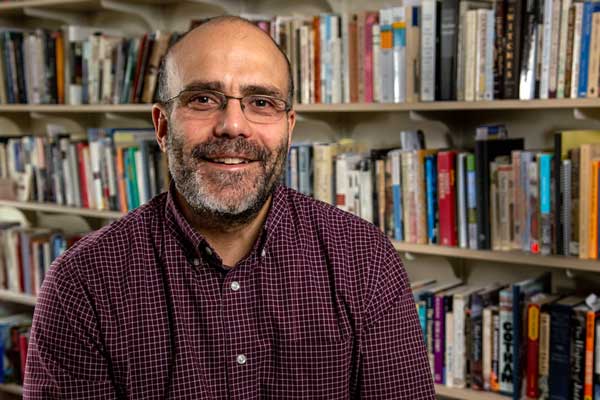An amazing department
The History and Political Science Department has some of the most committed and energetic professors I know — in a college filled with committed professors. Most importantly, we spend a lot of time with students, getting to know them academically and personally. We are constantly developing new and exciting courses that connect history, political science, global studies, and legal studies to pressing current needs and interests — often in creative ways. We use film, television, podcasts, memes, as well as service learning and other off-campus activities in our courses.
Why I love Naz students
My favorite qualities of Nazareth students are their kind-heartedness and belief in the good in humanity. Sometimes these qualities make teaching history hard because much of history is the study of terrible people doing terrible things or even well-meaning people making big mistakes by not seeing or even considering the consequences of their actions. Sometimes good intentions are not enough to make a situation better. That's a hard lesson to learn but an important one for well-meaning young people.
My students become historians
One of my favorite things to do is to have students develop their own historical research projects and have them find their own excitement by making historical documents (or films, television shows, or social media posts) come alive. These sources illuminate the fears, goals, and struggles of past actors and help demonstrate the commonalities that students have with people from the past.
My academic passions
I came to Nazareth in 2003 primarily to teach Native American and early American history. As an offshoot of those subjects, I developed an interest in the history of temperance movements in Native American communities, which brought me into a more recent era. The interactions between Native Americans, Europeans, and Africans contain a great deal of injustice, violence, and heartache; however, this complex and challenging story underlies the ultimate creation of the United States — and indeed the creation of all of the nations of the Americas. Appreciating the persistence of Indigenous people, polities, and cultures within these broader communities is cause for optimism and hope, amidst a story that is often a difficult one.
Alcohol in America
Lappas' course on alcohol in America was featured on a WXXI Connections show about The College Classes You Wish You Could've Taken.
The power of primary sources
I love diving into the primary sources and weaving together stories from them. From well-known documents like the Constitution to very obscure ones like private letters from unknown writers, small-town newspaper articles, esoteric government reports, or the meeting minutes of forgotten reform organizations, all of these scraps of paper can be brought together to create a story and help us better understand the past and our present.
Fun facts
- I wrote In League Against King Alcohol: Native American Women and the Woman's Christian Temperance Union, 1874-1933 (University of Oklahoma Press, February 2020). The book reveals how Native Americans worked to stop alcohol abuse and pressed for positive change — "a very important chapter of American cultural history."
- In addition to research, teaching, and writing, I have dozens of interests. I love woodworking, mountain biking, hiking, traveling, spending time with my family, and working in the garden.

Students say
"I continually try to model my teaching and advising on my experiences with Lappas. It is his generosity, accessibility, and commitment to teaching, and to supporting me both in and out of class, that has left the biggest impact. He has truly helped me survive and move forward during some of the most difficult experiences I faced as both an undergrad and, later, as I made my way through graduate school. The fact that he still meets with me when I'm in town today, and has consistently supported me past college through this point, demonstrates that most clearly." — Caitlin Howlett '08, visiting assistant professor of education studies, DePauw University
"I remember Tom pulling me aside at the end of the semester of my 400-level history class on Colonial America, to say that my final research paper was a good one, and that I was really good at writing and at writing in history. It was such a small gesture, yet it was a genuine moment of affirmation, generosity, and support, and it stuck with me. I always try to do the same with my own students now because Tom's gesture was a big part of what gave me the confidence to pursue my career in history." — Lori J. Daggar '09, Ph.D., assistant professor of history, Ursinus College
Faculty Spotlights
Wondering who else you can learn from — and who will support and challenge you? Check out more Faculty Spotlights.